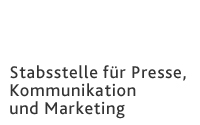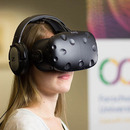Executive Department for
Press, Communication and Marketing
Adolf-Reichwein-Straße 2a Gebäude AVZ (Gebäudeteil AR-NA) 57068 Siegen
Phone: +49 (0)271/740-4915 Fax.: +49 (0)271/740-4911 E-Mail: presse@uni-siegen.de
Learning in a Virtual Reality Setting
At the Institute of Advanced Studies “ForschungsKollegSiegen” (FoKoS) of the University of Siegen, scientists are developing an innovative learning system, in which students move inside a virtual environment. A first application is already in use.
Students dive into a virtual working world. There, they can reproduce and understand different processes and procedures spontaneously - instead of merely understanding them theoretically. Based on this idea, an innovative learning system for vocational training and higher education is currently under development at the Institute of Advanced Studies “ForschungsKollegSiegen” (FoKoS). The first virtual reality application designed by researchers in the context of the project ELISE ("Development of an interactive and emotion-sensitive learning system for competency in the area of business process management") shows how learning in a virtual environment works in practice. It was presented to a wider audience at the accompanying conference on the National IT Summit "Digital Education".
Students enact business processes
Students are equipped with headphones, virtual reality glasses and a controller. They move through a virtual office building and have to perform a task: a virtual package is to be carried from one place to another, with the help of the controller, and handed over to an avatar. "It is a 'serious game', a digital learning game that demonstrates a simple business process," explains project coordinator Henrik Kampling. The package application, however, is only a first design, a so-called 'showcase', he emphasizes. Building on the technology, the team wants to develop more complex processes - for example the way of a package from the postal center to the various stations of the delivery to the recipient.
In addition to logistics processes, purchasing and production processes within virtual reality environments are also to be illustrated and made to be experienced. They can even be viewed from different perspectives - such as the customer, the employee or even the business object. But how must such a virtual learning system be designed so that learning processes can be optimized? Where can such programs be used? And are they even accepted by the potential users? The researchers would clarify questions like these within the framework of the ELISE project. "We hope to make a valuable contribution to the socially important area of 'lifelong learning' using the most modern technologies," says FoKoS Director Prof. Dr. Dr. Björn Niehaves.
The learning system is to recognize emotions
In order to take the individual needs of the student into account, the team works to make the new learning system intelligent: emotions such as frustration or boredom are recognized - and the learning content feed is adapted accordingly. If the student is frustrated because the process simulation is too fast and demanding, the speed can be automatically reduced to simplify the learning content. If, on the other hand, the tendency goes toward boredom, the level can be raised. Emotional detection functions by means of sensors which are worn on the body and, for example, measure the pulse or the heart rate.
"We are currently collecting data for emotion detection," says Henrik Kampling. For this purpose, the scientists expose voluntary test persons to different situations and collect body-related data - in addition to pulse and heart rate, they also count skin resistance or skin temperature. The results are subsequently assigned to emotions via pattern recognition algorithms and integrated into the learning system.
ELISE is interdisciplinary
The objective of the ELISE project is to develop a demonstrator for an interactive, virtual and emotionally sensitive learning system by 2019. It is an interdisciplinary project involving the School of Economic Disciplines, as well as the School of Science and Technology of the University of Siegen. FoKoS Director Dr. Niehaves explains that this is an intersection, “ELISE is an exemplary project, which shows the innovative performances that can be brought about by the fusion of different research disciplines under one roof.
Background:
From the University of Siegen, the research teams of Prof. Dr. Dr. Björn Niehaves (Chair of Business Information Systems and Center for Responsible Innovation & Design), Prof. Dr. Rainer Brück (Chair of Microsystem Design) and Prof. Dr. Marcin Grzegorzek (Research Group on Pattern Recognition) participate in the ELISE project. They work with the game developer "Limbic Entertainment GmbH" (Thomas Steuber, consortium leader) and the software producer "Software AG" (Marc Dorchain). The research project is funded by the Federal Ministry of Education and Research (BMBF) with 1.5 million euros. Information and current publications on the project can be found at www.uni-siegen.de/fokos/.
Contact person:
Henrik Kampeling (research associate at FoKoS)
e-mail: henrik.kampling@uni-siegen.de Tel: +49-271-740-3277
The researchers are still looking for volunteer test persons for the tests for emotion detection. Persons over 18 years who are interested in participating can contact Henrik Kampling by e-mail: henrik.kampling@uni-siegen.de


